Exploring the MarTech Ecosystem: Key Insights on MarTech Trends
Published on March 06, 2025/Last edited on March 06, 2025/15 min read
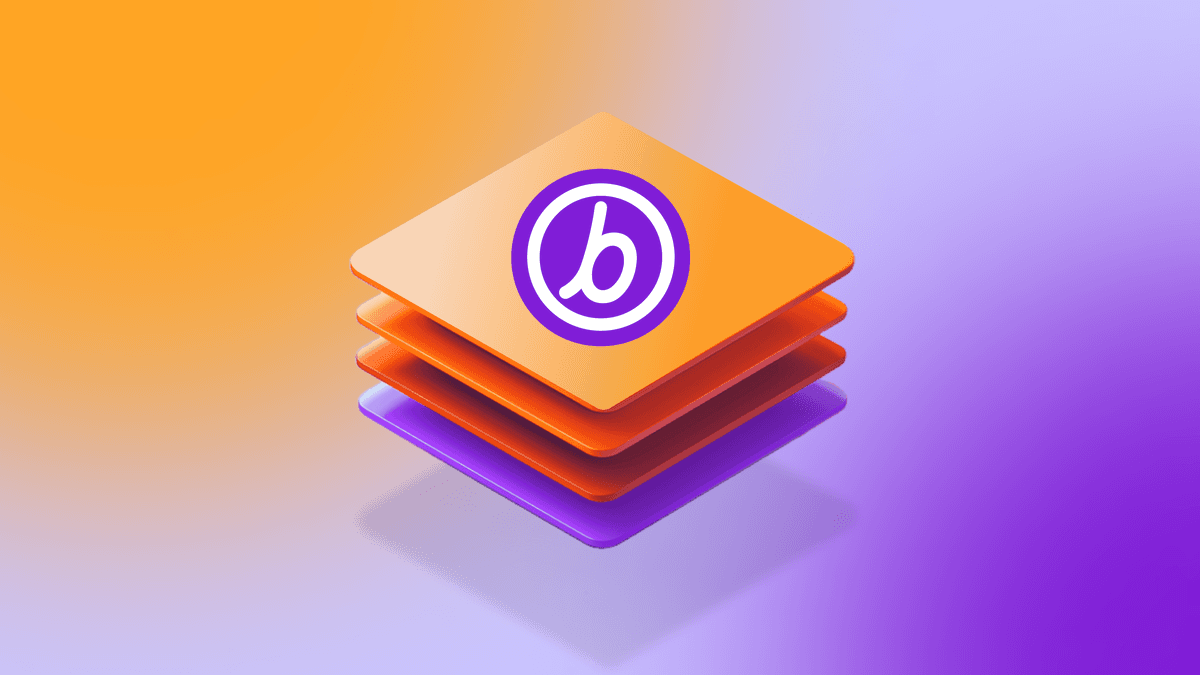

Team Braze
In a world where technology is increasingly central to the way customers engage with your brand, your company’s MarTech ecosystem—aka a marketing technology ecosystem or a MarTech stack—plays a fundamental role in being able to foster meaningful customer relationships and achieve key gains in customer lifetime value, retention, and more.
Marketing Stacks and Ecosystems 101: What Is a Marketing Tech Stack? What Is a MarTech Ecosystem?
Let’s start with the concept of marketing technology. This refers to any technology solution that supports a marketing goal. As a rule, when we talk about marketing technology, what we’re really talking about is software that can help you reach your marketing objectives. There are many different types of marketing technology solutions out there. Some are intended to make it easier to manage user data, for instance, while others help marketers carry out their customer engagement efforts or support the analysis of the information that marketing teams possess to better understand their customers.
Up next: What’s MarTech? MarTech is a portmanteau—or blending—of two words, marketing and technology.
Now that we’ve covered marketing technologies and MarTech, we can define what a MarTech ecosystem is, which you’ll also see referred to as a marketing tech stack. MarTech ecosystems—or MarTech stacks—are made up of all of the different marketing technology solutions a given brand leverages to help execute their marketing strategy.
Think of all of the tools your company currently uses to learn about, connect with, and deliver experiences for your customers. These technology platforms are the building blocks of your company's marketing tech stack. Even if your organization only uses two different platforms to support your efforts, you have a MarTech ecosystem, albeit quite a small one.
Does every company have a marketing tech stack?
While not every company thinks of the software and tools that they use for marketing as a “stack,” it’s the rare brand that doesn’t use any marketing technology, or only uses one tool. All it takes is for a business to have just two marketing solutions and you’ve got a stack.
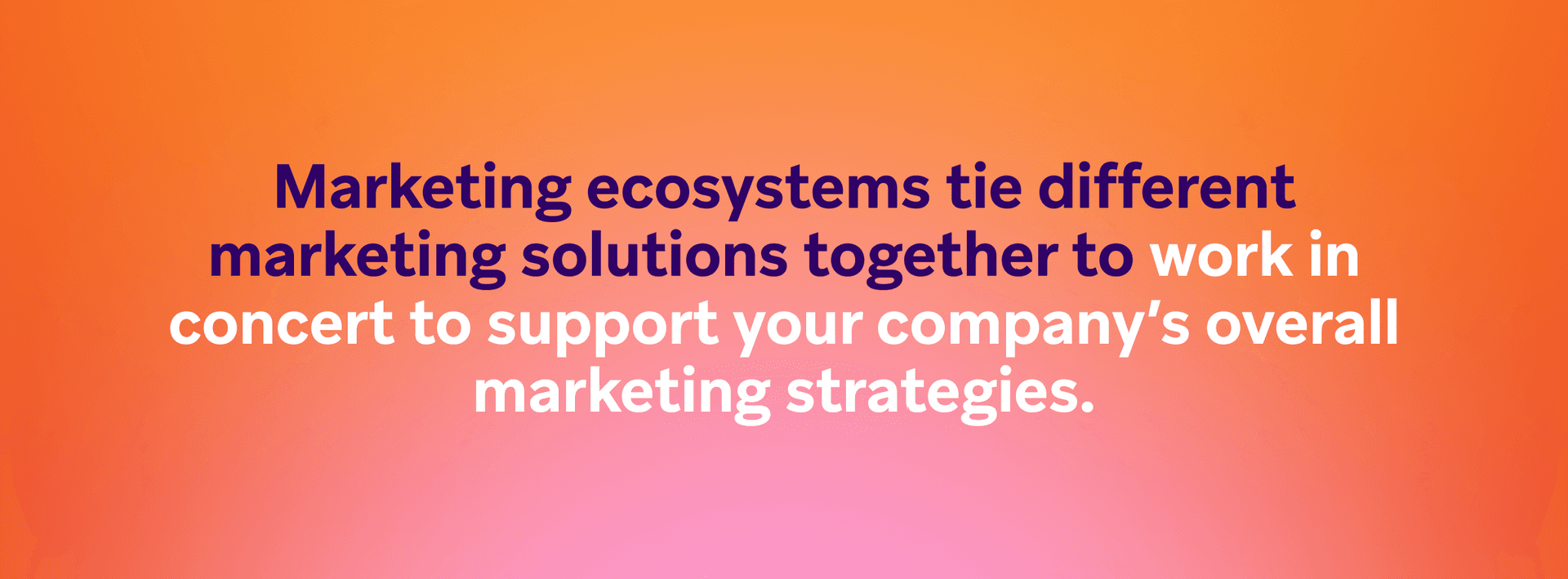
What are the main components of a successful MarTech stack?
Wondering which technologies are must-haves for the modern marketing tech stack? The truth is, there’s no single correct answer. No two brands' marketing ecosystems will look exactly alike. The flexibility of the stack is part of its power and a truly successful stack should be assembled and customized to fit each individual company’s specific marketing needs, customer base, and business goals.
That said, the following tools are some common solutions many organizations use to power their marketing efforts:
- Customer engagement platforms
- Customer data platforms (CDPs)
- Data warehouses
- Product and behavioral analytics platforms
- Customer service platforms
- AdTech and ad retargeting tools
- Social media messaging (SMM) and social listening tools
- Conversion optimization tools, including UI/UX testing software
- Content management systems (CMS)
- Marketing calendar, organization, and task management tools
- Search engine optimization (SEO) and search engine marketing (SEM) tools
- Data enrichment tools, including location data providers
- Message translation tools
- Deep linking tools
- Recommendation engines
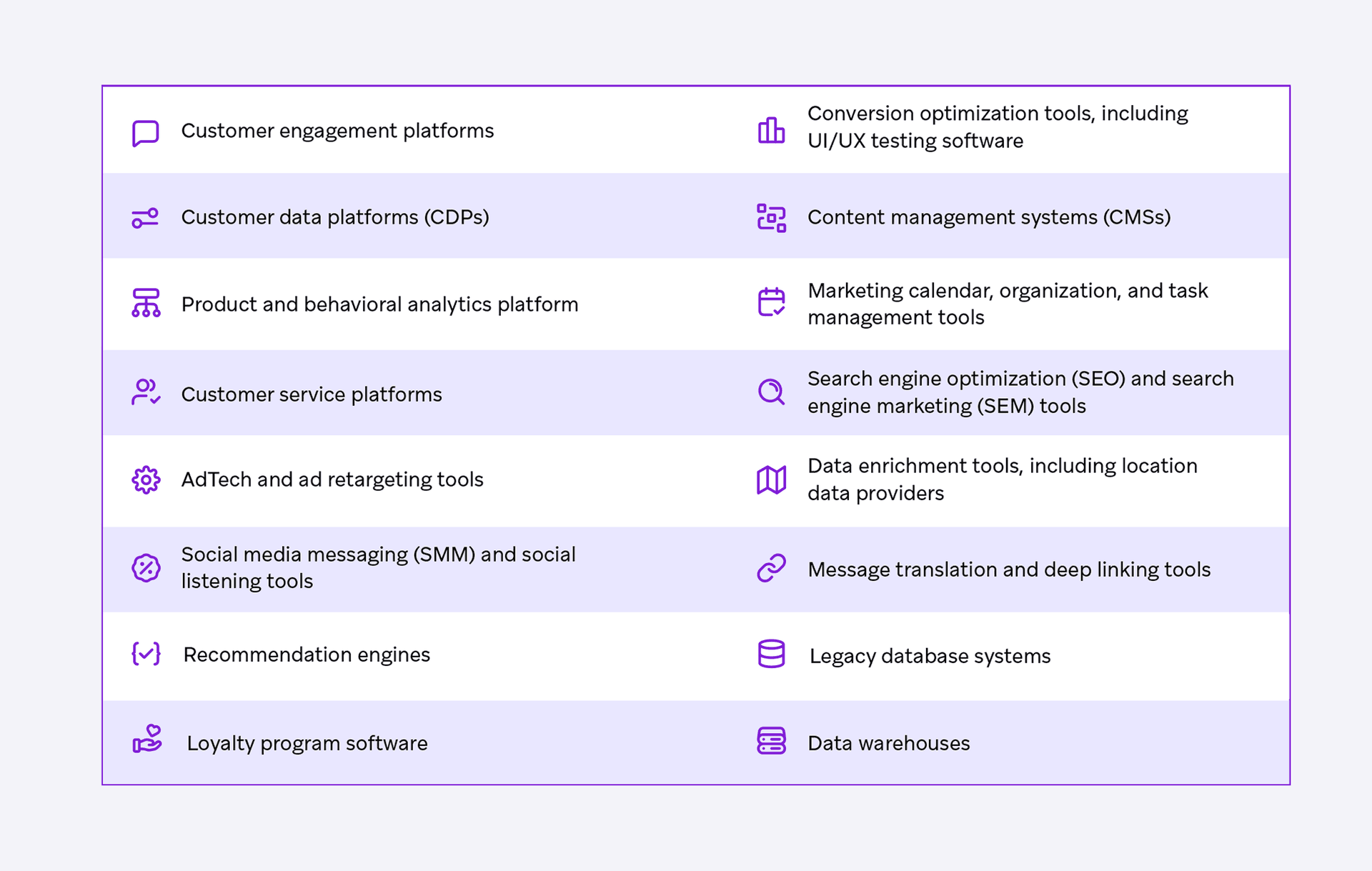
Keep in mind, your company’s marketing and customer engagement needs are just like your customers—unique. And the reality is, different brands with different strategies and different business models are naturally going to need different technology ecosystems to fit their particular use cases.
What tools are commonly included in a MarTech stack diagram?
Here are some sample MarTech stack diagrams for QSR brands, fitness brands, media and entertainment streaming brands, eCommerce brands, and airlines.
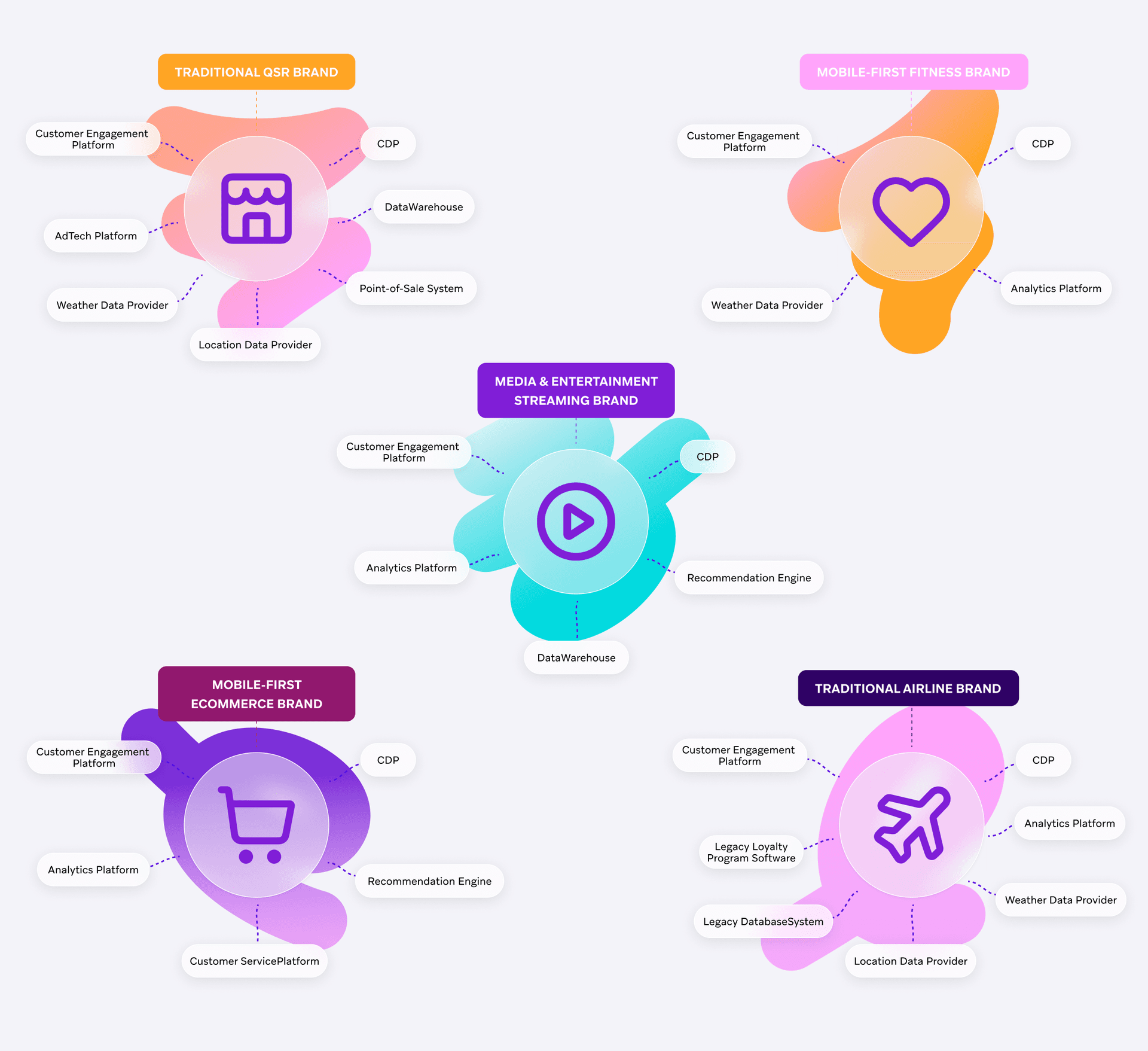
For (fictional) financial services brand Pyrite Financial, having the right mix of technologies supports seamless and location-informed messaging, enables automatic halts on marketing campaigns when customers have an open support ticket, and makes deep dives into engagement patterns and customer behavior possible.
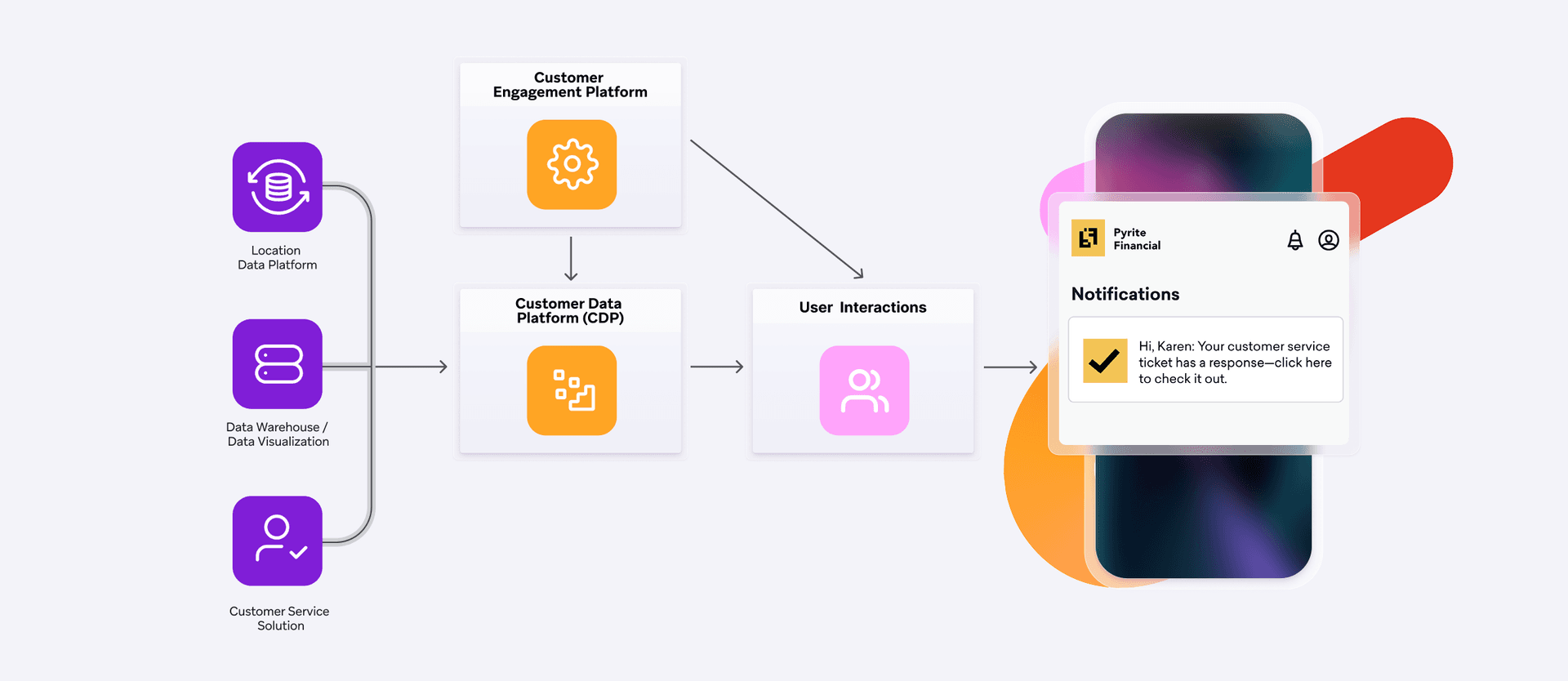
What are some best practices for building a MarTech ecosystem?
Follow these steps to create a well-designed marketing tech stack that empowers the marketing team to set up and manage complex marketing efforts with minimal reliance on the product team.
1. Be clear about your organization’s and your customers’ needs. To ensure that you’re putting together a stack that can effectively serve your brand’s purposes, you need to be clear about your organization’s needs—and the needs of your customers.
Think about the platforms that your customers use to engage with your brand. Think about whether your marketing strategy requires specialized tools like customer service platforms or recommendation engines. And once you have a comprehensive picture of the customer experience you’re looking to provide and the technologies that you need to make it possible, it’s time to investigate whether they’re built to support the kinds of seamless, timely data management that best-in-class customer experiences are built on.
2. Design the tech stack with an eye toward customer engagement. A stack that truly fits your brand’s needs should give marketers the ability to quickly react to customer trends by creating user-centric marketing programs that drive higher engagement. Having the right combination of tools enables you to work smarter and faster.
3. Reduce marketing’s need to lean on engineering. The rise of digital and mobile devices has made marketing teams more dependent on technology. Some marketing tech can function effectively with minimal support from other departments, while other solutions may require you to go hat in hand to your brand’s engineering team on a regular basis. But a well-designed marketing tech stack empowers the marketing team to set up and manage complex marketing efforts with minimal reliance on technical teams. That’s good news for marketers, and their customers, too. When marketing strategies are less dependent on other teams for their success, marketers can autonomously send campaigns that are more responsive to customer needs and wants, supporting a better experience. Another benefit for technical teams: These are highly expensive resources with unique skills that can't be transferred over to others. By ensuring they aren't spending time on support work, brands create a win-win for both marketing and technical teams.
4. Get the fundamentals down. Having solid tech fundamentals in place is a precursor for driving impact with marketing initiatives. You need proper measurement and an experimental framework, accompanied by behavioral analytics that enable meaningful segmentation and targeting. If you have a customer engagement platform with the power to target the messages you send, but aren’t collecting data to support segmentation and customization, you can’t make full use of the technology you’re paying for.
5. Don’t build a stack without considering marketing needs down the line. Think about where you’re headed from a product and marketing perspective, and ensure that the tech stack is designed to be flexible enough to meet your needs in the future. Switching platforms is costly and can disrupt momentum. Ideally, your stack should be designed to grow and evolve with your business and marketing needs.
6. Remember that the stack you assemble will impact other departments. While your marketing team may make the final call regarding which technologies to include in the tech stack, there can be other stakeholders. Keep in mind that marketing tech stacks will either have direct or secondary impact on almost every department outside of marketing. To prevent potential pushback or confusion, align cross-functionally on the critical needs and priorities of the business before building out or making major adjustments to your ecosystem.
7. Align your stack budget with marketing goals. Putting together a best-in-class stack that fits your brand’s needs will cost money. Make sure you’re being clear-headed about the financial side of the stack you build. Have a rough budget in mind: For instance, 45% for user acquisition, 45% for re-engagement and retention, and 10% for other tools. Another key is avoiding inefficiency, redundancy, and duplication. Get started by first identifying your organization’s needs, then see if your existing investments are capable of executing your use case. For example, your goal might be to automate your ID resolution so that you don't have to assign a particular resource to manage this process. Before investing in a new solution, check if this is something you can manage within your customer engagement platform. However, if your goal is to manage IDs for additional use cases such as customer engagement, financial profile, etc, then it might be useful to invest in a specific solution that can activate additional use cases.
8. Don’t add new tools to your stack without designating a manager. You don’t want to be paying for a product and not using it to its fullest potential. Establish which members of your team will implement, utilize, and take ownership of each platform early on. Assembling a stack can be a major investment of time, money, and other resources. Having a clear picture of who is overseeing what can help you see higher benefits from the investment over time.
Why are MarTech ecosystems important for modern marketing?
MarTech ecosystems are important for modern marketing because they help meet the needs of different teams within a given organization. Built-for-purpose marketing, engagement, and data management technologies have made it possible for brands to create unique technology ecosystems that are tailored to their teams’ particular needs and specific business goals. And because they’re not locked into a single provider, these companies have the flexibility to add or substitute tools that aren’t cutting it. These hybrid stacks—built with best-in-class components—have shown themselves to be ideal for supporting today’s more agile marketing and sales operations, while also paving the way for more personalized, more impactful customer experiences.
What are the top trends in MarTech ecosystems for 2025?
CMSWire asked C-suite executives what shifts they expect to see in marketing technology in 2025, and here’s what experts predict brands will focus on this year:
- Investing in unified MarTech stacks that eliminate silos, enhance collaboration, increase efficiencies, and make consistent customer experiences possible.
- Prioritizing AI-driven hyper-personalization capabilities to meet customers’ needs at the 1:1 level
- Seeking out solutions that support first-party data-driven marketing strategies as third-party cookies are phased out
- Embracing predictive, outcome-driven AI solutions that enables marketers to optimize campaigns for maximum results across channels
- Strengthening their owned digital footprints through well-designed websites and online experiences
- Vetting solutions that can help with privacy and compliance efforts, and that support the responsible use of data as privacy regulations and consumer privacy concerns increase
What role does data integration play in building an effective MarTech ecosystem?
Data integration is an essential part of building a MarTech ecosystem that delivers your company’s desired outcomes. It’s important to build a source a source of truth—many brands use data warehouses, while others choose to use a CDP as part of their MarTech stack to activate more specific use cases:
- Automatically collect, centralize, and make use of the customer data available across every relevant tool the company uses and from every digital property or touchpoint associated with customers, freeing up engineers, marketers, and product managers to focus on bigger initiatives.
- Ensure access to timely, meaningful customer data across the MarTech ecosystem.
- Seamlessly share this data across other components of the MarTech stack, including with customer engagement platforms like Braze.
- Deliver better, more connected experiences for customers across devices, channels, and touchpoints.
- Eliminate data silos and minimize the amount of time that has to be spent manually trying to process data and individually uploading it to the technologies associated with each of a company’s engagement channels.
- Make sure that everyone within an organization has access to the data they need and without relying on backend technical work every time, thereby creating a culture that’s genuinely driven by data—supporting smarter collaboration and stronger outcomes.
How Do MarTech Stacks Contribute to Customer Engagement?
The rise of smartphones and other mobile devices in recent years has upended the status quo of marketing, making it possible for brands to better understand and reach their customers—but only if they have the right technology ecosystem in place.
Your brand’s marketing technology stack plays a major role in determining the long-term success of your engagement and retention efforts. Get it right and you can provide the kinds of relevant, personalized, data-driven experiences that customers crave—and keep them coming back for more. Get it wrong, and your brand may find itself serving up broken, frustrating experiences that drive disengagement and churn.
How does the MarTech stack at Braze support customer engagement?
For the third year in a row, Braze has been named a leader in Snowflake’s Modern Marketing Data Stack, a report that recognizes the top MarTech and AdTech solutions. In 2025, we were recognized as a leader in the “Marketing & Customer Engagement” category.
From our earliest days, we’ve built out the Braze customer engagement platform so that it can work seamlessly with other MarTech stack components. The Braze platform has been architected using streaming data, which processes data in real time, to enable in-the-moment flows of information across the MarTech ecosystem, making real-time personalization possible at scale. Our solution is built for today’s on-demand, always-connected customers. If properly implemented, we can replace decades-old databases and poorly integrated internal and external tools with live views of every customer, highly intuitive customer journey building, in-the-moment campaign optimization, and more.
In addition, we’ve created Braze Alloys, an ever-expanding, open, and flexible MarTech ecosystem of 150+ Braze partners, including data warehouses, CDPs, analytics solutions, AdTech platforms, and other must-have components of a successful MarTech stack, to work alongside the other technologies your team already uses to enable more meaningful customer experiences.
Braze Alloys makes it easy for companies to design MarTech ecosystems that meet their business and customers’ needs with solutions spanning:
- Data and infrastructure agility platforms (data warehouses, customer data platforms)
- Insights tools (behavioral and product/web analytics, business intelligence tools)
- Channel extensions tools (testing software, deliverability technologies, localization solutions, workflow automation tools, etc.)
- Additional channels (direct mail, Facebook Messenger, WhatsApp, TikTok, etc.)
- Data augmentation (recommendation engines, contextual platforms)
- Advertising technologies (attribution platforms, deep linking tools, social media technologies, retargeting capabilities)
How do Braze, Segment, and Amplitude enhance MarTech stacks for customer engagement?
For brands already leveraging Braze, Segment and Amplitude are two Braze partner solutions that—when used in conjunction with the Braze platform—enable marketing teams to collect consumer engagement data and optimize campaigns based on insights.
How Segment and Braze support efficient customer engagement
With Segment, you’re able to collect and unify first-party customer data across all channels, creating a single, unified profile of your customers. These profiles are the foundation for personalized campaigns that are designed to drive improved conversions and deliver customer engagement at scale.
This powerful partnership enables Braze to both receive and activate these profiles and then send data back to Segment, where it can be seamlessly shared with other layers of your MarTech stack.
How Amplitude and Braze support smarter behavioral targeting, personalization, and engagement measurement
Once that first-party data is organized and ready to be put to use, Braze partner Amplitude, a leader in digital analytics, comes into play, providing analytics that enable marketers to understand how people are using their products so they can deliver better product experiences that drive growth.
With an integrated, full self-service solution, teams can explore opportunities to target users based on behaviors and desired outcomes.
"With Amplitude, product and marketing teams can apply insights from in-depth behavioral data and send cohorts of users directly to customer engagement platforms like Braze," Sean Kilcullen, Group Product Manager at Amplitude, explains. This, in turn, allows for the creation of more personalized messaging campaigns on the Braze platform. The results of these campaigns—such as impact on engagement, conversion, and lifetime value—can then be measured back in Amplitude.
How can companies close the mobile MarTech gap for improved engagement?
The divide between what’s possible to achieve with the marketing technologies that exist today and what marketers can do with the tools they’re actually using is known as the MarTech gap, and it’s particularly worrisome when it comes to mobile.
Closing the gap requires setting up the right mobile marketing stack—that is a best-in-class mobile marketing platform that includes mobile marketing automation, segmentation, cross-channel support for mobile marketing campaigns, real-time data, mobile marketing analytics, and personalization—for your brand and establishing a process for connecting it all.
The newest mobile marketing tools allow brands to engage with customers with more efficiency and at higher returns, and that’s worth investing in.
How can businesses improve their MarTech ecosystems for better customer insights?
Businesses can improve their MarTech ecosystems for better customer insights by leveraging a customer data platform.
CDPs are designed to ensure that the lines of communication are open between as many different technologies within your stack as possible, while also supporting increased data agility within your ecosystem and enabling seamless movement of data between all parts of your ecosystem and across a variety of customer touchpoints without requiring endless custom integrations.
By leveraging a CDP as part of a built-for-purpose stack, you can connect and unify your first-party data (even if it comes from a wide variety of platforms, channels, and other sources), while also helping to ensure that the data you have is accurate and that you’re catering each customer interaction to that unique individual’s preferences.
Be Absolutely Engaging.™
Sign up for regular updates from Braze.
Related Content
 Article13 min read
Article13 min readDemographic segmentation: How to do It, examples and best practices
January 30, 2026 Article6 min read
Article6 min readLanding pages made simple: How to build your first Braze Landing Page
January 30, 2026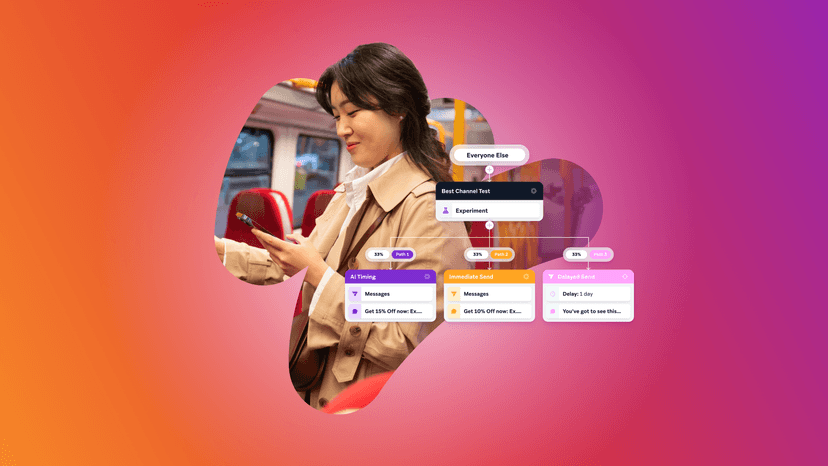 Article9 min read
Article9 min readAI decision making: How brands use intelligent automation to scale personalization and drive revenue
January 30, 2026